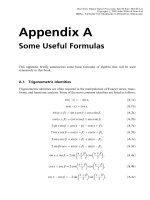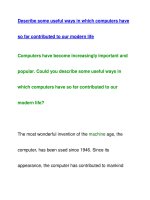Some useful spelling rules 2
Bạn đang xem bản rút gọn của tài liệu. Xem và tải ngay bản đầy đủ của tài liệu tại đây (14.68 KB, 2 trang )
Some useful spelling rules
Rule 1
When a weak verb ends in a short vowel + consonant, the final consonant is not doubled to form the past tense,
unless the accent falls on the last syllable.
Budget – budgeted (NOT budgetted)
Offer – offered (NOT offerred)
Benefit – benefited (NOT benefitted)
Notes
Worship is an exception to this rule. Its past tense is formed by doubling the final consonant.
Worship – worshipped (NOT worshiped)
If the accent falls on the last syllable, the consonant is doubled even if the word ends in a short vowel +
consonant.
So we have
Occur – occurred (NOT Occured)
Transfer – transferred (NOT transfered)
Begin – beginning (NOT begining)
If the final consonant is ‘l’, it is always doubled.
Travel – travelled
Level – leveled
Parallel is an exception to this rule. Its past tense is paralleled (NOT parallelled). Nowadays traveled is also
considered correct.
Rule 2
Short monosyllables always double their final consonant.
Shop – shopping
Let – letting
‘ie’ and ‘ei’
The general rule is ‘i’ before ‘e’ except after ‘c’.
Examples are: siege, believe, friend
But receive, deceive, ceiling etc.
There are several exceptions to this rule.
Reign, neighbor, heir, seize, leisure, weird
Dis and mis
Never double the ‘s’ of these prefixes. When a second ‘s’ occurs it is the first letter of the next syllable.
Examples are: dismiss (not dissmiss), misplace (not missplace)
dissent (dis-sent), misspell (mis-spell)
‘us’ and ‘ous’
Nouns end in ‘us’. Adjectives end in ‘ous‘. So we have:
Census, genius (nouns)
Jealous, tremendous,
Stay on top of your writing! Download our grammar guide from www.englishgrammar.org to stay up-to-date.
Powered by TCPDF (www.tcpdf.org)









